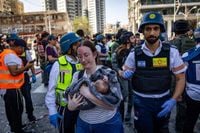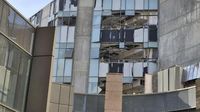On Thursday, June 19, 2025, a dramatic escalation in the ongoing conflict between Israel and Iran unfolded as an Iranian ballistic missile struck Soroka Hospital in Beersheba, southern Israel. The attack, part of a larger barrage that hit multiple sites across central and southern Israel, has left significant damage and dozens injured, intensifying tensions in a conflict now entering its second week.
The Israel Defense Forces (IDF) confirmed that several missile hits occurred during the barrage, with one directly impacting Soroka Hospital, the largest medical facility in southern Israel. The hospital, which serves over one million residents of the Negev region, sustained substantial damage, including collapsed ceilings and flooding, leading to an evacuation of patients and staff to protected areas within the complex.
"There is no building. The dining hall building collapsed," a witness at the hospital recounted. Medical teams were sheltering with patients at the time of the strike, and fortunately, a special evacuation order had been issued the day before for the floor that was hit. A doctor described this evacuation as "a great miracle," emphasizing how it likely prevented a far worse tragedy.
Following the strike, concerns arose about a possible hazardous materials leak on an upper floor, prompting police to evacuate the area. However, this threat was later ruled out. The hospital spokesperson requested the public avoid the facility as damage assessment and casualty evaluations continued. Approximately 80 people were lightly wounded from the blast, and the hospital has since discharged more than half of its patients, currently operating at only 26% capacity and accepting only life-threatening cases.
The missile barrage also caused injuries and damage in other locations. At least six people were seriously wounded, including four from a direct hit on a residential building in Holon, south of Tel Aviv, and two in Ramat Gan. Over 200 people were injured nationwide, with many treated for anxiety or minor injuries sustained while seeking shelter. Hospitals across Israel, including Tel Aviv Sourasky Medical Center, Sheba Medical Center, and Rabin Medical Center, received victims from the attacks.
Among those affected was the home of former Health Minister Dan Naveh in Savyon, southeast of Ramat Gan, which suffered severe shrapnel damage. Naveh's children were in a safe room during the strike and survived unharmed. He described the experience as "a miracle," highlighting the harrowing nature of the missile attacks on civilian areas.
The Iranian missile strike on Soroka Hospital drew swift condemnation from Israeli officials. Foreign Minister Gideon Sa'ar, who visited the hospital on the day of the attack, labeled it "clearly a war crime," accusing the Iranian regime of deliberately targeting civilians. "They are deliberately targeting the civilian population, civilian targets, civilians, children, elderly people. It is unacceptable," Sa'ar said.
Health Minister Uriel Buso echoed these sentiments, calling the strike "an act of terror" that crosses a red line and praising the Health Ministry's preparations that helped avert a major disaster. National Security Minister Itamar Ben-Gvir condemned the Iranian regime as "Nazis who launch missiles at hospitals, at the elderly, and at children," and described Israel's military campaign, dubbed "Operation Rising Lion," as "the most just campaign Israel has ever embarked on in its history."
IDF Spokesperson Brigadier General Effie Defrin emphasized the strategic nature of the conflict, noting that Soroka Hospital serves a diverse population of over one million Israelis. Defrin highlighted that Iran has launched over 450 ballistic missiles and hundreds of unmanned aerial vehicles at Israel in less than a week. He stressed that Israel’s military operations aim to eliminate an existential threat by targeting Iranian nuclear weapons facilities, missile launchers, and military sites. "We cannot—and will not—allow this regime to obtain nuclear weapons or expand its missile arsenal," Defrin stated firmly.
Iran, for its part, denied targeting Soroka Hospital directly. Iranian Foreign Minister Seyed Abbas Araghchi claimed the missile strike was aimed at an Israeli military command, control, and intelligence headquarters adjacent to the hospital. Posting on social media platform X, Araghchi asserted that the blast caused only "superficial damage to a small section" of Soroka and accused Israel of initiating the bloodshed. He stated, "It is the Israeli regime and not Iran that initiated all this bloodshed, and it is Israeli war criminals and not Iranians who are targeting hospitals and civilians." Araghchi further claimed that "hundreds of innocent Iranians have been murdered" due to Israeli strikes on Iran.
The missile attacks on Israel come amid ongoing Israeli strikes on Iranian nuclear and military facilities, including the Arak heavy water reactor, which Israel had targeted earlier in the week. Israeli Military Intelligence chief Shlomi Binder revealed that during the first night of Israel's offensive, approximately 30 Iranian military commanders were assassinated. The conflict has resulted in significant casualties on both sides, with Iranian strikes reportedly killing 24 people in Israel and wounding hundreds more, including hits on residential buildings in central Israel.
Meanwhile, the IDF announced the killing of a Hezbollah operative involved in attempts to rebuild terrorist infrastructure in southern Lebanon. This development underscores the broader regional implications and the complexity of the conflict beyond the Israel-Iran direct confrontation.
International diplomatic efforts are underway to de-escalate the crisis. U.S. Special Envoy Steve Witkoff and Iranian Foreign Minister Abbas Araghchi have engaged in several phone conversations since the strikes began, seeking a diplomatic resolution. However, Araghchi has maintained that Tehran will not return to negotiations unless Israel halts its attacks. Discussions have included a U.S. proposal from late May to establish a regional consortium to enrich uranium outside Iran, a plan Tehran has rejected.
German Chancellor Friedrich Merz spoke with Israeli Prime Minister Benjamin Netanyahu on June 18, calling for moderation in Israel's campaign against Iran while expressing support in principle for Israeli military actions against Iran's nuclear infrastructure. Germany is set to host nuclear talks with European partners and Iranian officials in Geneva, aiming to secure assurances that Iran's nuclear program remains peaceful. Merz also coordinated with the Emir of Qatar to prevent escalation into a wider regional conflict, highlighting the delicate balance international actors seek amid rising hostilities.
President Isaac Herzog addressed the missile attacks, emphasizing Soroka Hospital's role as a symbol of coexistence, serving Israelis and Palestinians alike. He highlighted the hospital staff's dedication, working side by side in extraordinary harmony, united by their mission to heal. Herzog extended strength and support to medical teams, patients, and residents affected by the missile strikes, underscoring the human cost of the conflict.
As the conflict continues, the missile strikes on civilian infrastructure, including hospitals and residential areas, raise grave concerns about the humanitarian impact and adherence to international law. The Soroka Hospital attack, in particular, stands as a stark reminder of the war's reach into the lives of ordinary people and the fragile nature of medical sanctuaries in times of war.
The situation remains volatile, with both sides entrenched in their positions and military operations ongoing. The international community watches closely as diplomatic channels attempt to navigate a path toward de-escalation, even as the sounds of sirens and missile impacts resonate across Israel.


